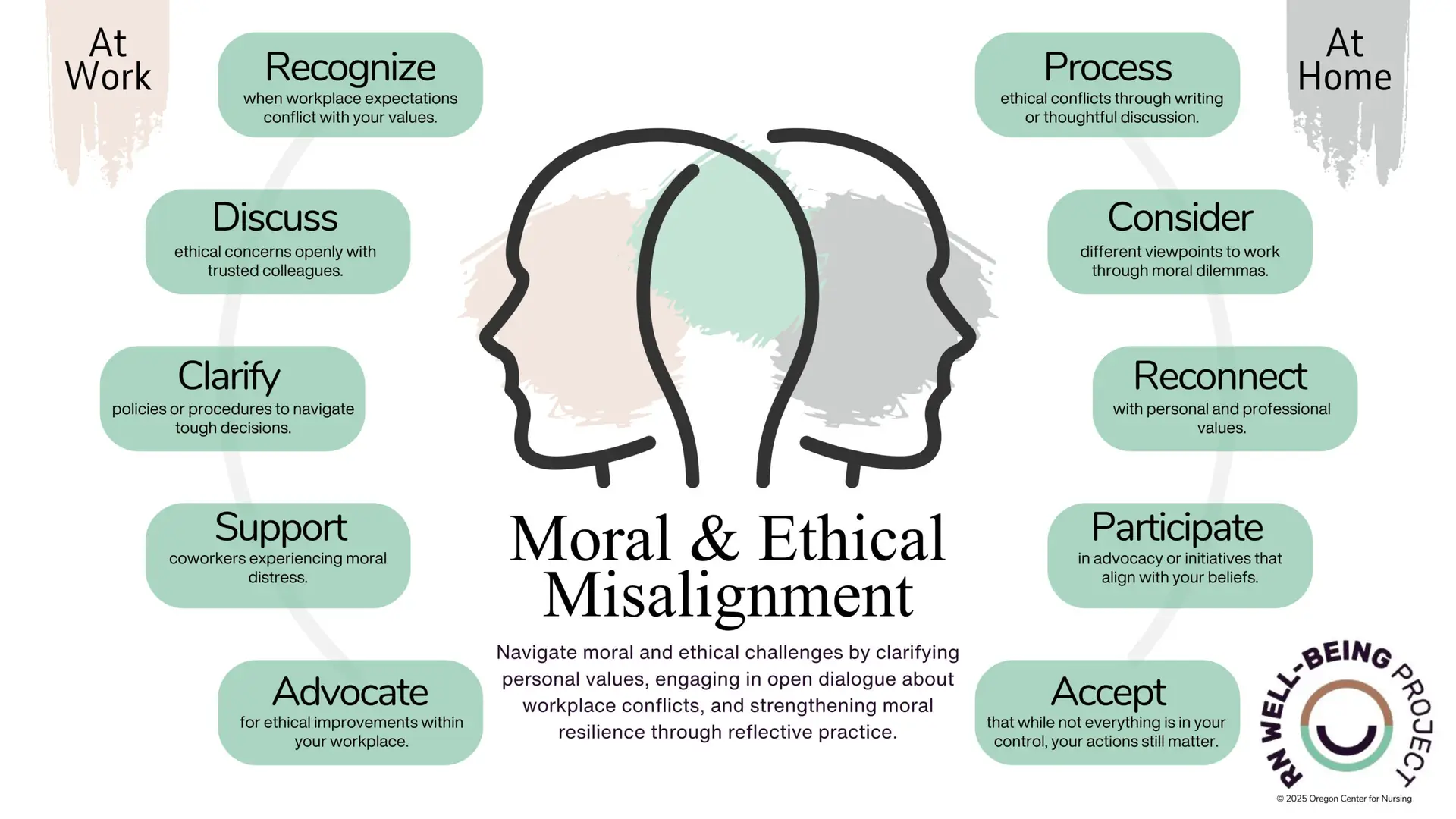Moral & Ethical Misalignment: Navigating Workplace Conflict
Nursing is built on compassion and ethics, but sometimes the reality of the job doesn’t match personal values (morals) or professional standards (ethics). Moral and ethical misalignment happens when the care you want to provide conflicts with workplace policies, resources, or expectations. This can lead to moral suffering, which shows up in different ways:
Moral Stress – That uneasy feeling when your personal values clash with the decisions or actions required in your workplace (1).
Moral Distress – Knowing the right thing to do but feeling powerless to act because of institutional constraints (2-7).
Moral Injury – A deeper, more lasting wound that occurs when you’re forced to act against your conscience, leading to guilt, shame, or a sense of betrayal (2, 8-10).
- You may feel: Powerless, frustrated, or even betrayed when forced to act against your moral beliefs. You may experience guilt, shame, or resentment (1, 5, 9).
- Why it matters: Unresolved moral and ethical misalignmet can erode your sense of purpose, damage trust in leadership, and contribute to emotional distress, leading to long-term moral suffering and professional dissatisfaction (3, 7).
Recognizing these challenges is the first step in addressing them. Finding support, discussing ethical concerns, and advocating for systemic change can help protect your well-being and the integrity of your practice.
References
- Riedel, P., Kreh, A., Kulcar, V., Lieber, A. S., & Juen, B. (2022). A Scoping Review of Moral Stressors, Moral Distress and Moral Injury in Healthcare Workers during COVID-19. International Journal of Environmental Research and Public Health, 19(3), 1666. https://doi.org/10.3390/ijerph19031666
- Buchbinder, M., Browne, A., Berlinger, N., Jenkins, T. M., & Buchbinder, L. (2023). Moral Stress and Moral Distress: Confronting Challenges in Healthcare Systems under Pressure. American Journal of Bioethics, 1–15. https://doi.org/10.1080/15265161.2023.2224270
- Schlak, A. E., Rosa, W. E., Rushton, C. H., Poghosyan, L., Root, M. C., & McHugh, M. D. (2022). An expanded institutional- and national-level blueprint to address nurse burnout and moral suffering amid the evolving pandemic. Nursing Management, 53(1), 16–27. https://doi.org/10.1097/01.numa.0000805032.15402.b3
- Fink-Samnick, E. (2022). Collective Occupational Trauma, Health Care Quality, and Trauma-Informed Leadership. Professional Case Management, 27(3), 107–123. https://doi.org/10.1097/ncm.0000000000000559
- Grimell, J., & Nilsson, S. (2020). An advanced perspective on moral challenges and their health-related outcomes through an integration of the moral distress and moral injury theories. Military Psychology, 32(6), 380–388. https://doi.org/10.1080/08995605.2020.1794478
- Isobel, S., & Thomas, M. (2021). Vicarious trauma and nursing: An integrative review. International Journal of Mental Health Nursing, 31(2), 247–259. https://doi.org/10.1111/inm.12953
- Jones-Bonofiglio, K. (2020). Health Care Ethics through the Lens of Moral Distress. In The International Library of Bioethics. https://doi.org/10.1007/978-3-030-56156-7
- Riedel, P., Kreh, A., Kulcar, V., Lieber, A. S., & Juen, B. (2022). A Scoping Review of Moral Stressors, Moral Distress and Moral Injury in Healthcare Workers during COVID-19. International Journal of Environmental Research and Public Health, 19(3), 1666. https://doi.org/10.3390/ijerph19031666
- Rushton, C. H. (2023). Transforming moral suffering by cultivating moral resilience and ethical practice. American Journal of Critical Care, 32(3), 156. https://doi.org/10.4037/ajcc2023594
- Schlak, A. E., Rosa, W. E., Rushton, C. H., Poghosyan, L., Root, M. C., & McHugh, M. D. (2022). An expanded institutional- and national-level blueprint to address nurse burnout and moral suffering amid the evolving pandemic. Nursing Management, 53(1), 16–27. https://doi.org/10.1097/01.numa.0000805032.15402.b3
Where can Moral & Ethical Misalignment occur?
Moral and ethical misalignment can occur in many areas of nursing, from direct patient care to team dynamics, workplace policies, and broader healthcare systems. It often arises in high-pressure environments where personal values, institutional expectations, and systemic constraints collide (1).
- Personal Conflicts – Distress can arise when witnessing unethical behavior, feeling deceived, or being unable to act according to your moral beliefs. These moments can be especially difficult when decisions feel out of your control (2-3).
- Patient Care Conflicts – Misalignment can occur when patients prioritize faith, family, or finances over medical advice, or when you must provide care in unsafe conditions, deliver non-beneficial treatments, or navigate communication breakdowns (1-3).
- Team Conflicts – Poor collaboration, workplace bullying, or unsafe practices can create ethical tensions. Differences in treatment approaches, cultural values, or emergency protocols may also lead to moral strain between colleagues (2-3).
- Workplace Conflicts – Institutional policies, staffing shortages, leadership decisions, and systemic racism can leave nurses feeling unsupported. Barriers that prevent equitable care, fair treatment, or diversity in leadership can create moral distress (4-5).
- Societal Conflicts – Healthcare disparities, restrictive public policies, and a lack of ethical guidance can create ongoing moral challenges. When larger systems fail to support ethical and equitable care, individual nurses often bear the burden (3, 5).
Recognizing where misalignment occurs can help you navigate challenges, seek support, and advocate for change.
- Kontos, N. (2019). Ethics of Incongruity: Moral tension generators in clinical medicine. Journal of Medical Ethics, 45(4), 244–248. https://doi.org/10.1136/medethics-2018-105161
- Riedel, P., Kreh, A., Kulcar, V., Lieber, A. S., & Juen, B. (2022). A Scoping Review of Moral Stressors, Moral Distress and Moral Injury in Healthcare Workers during COVID-19. International Journal of Environmental Research and Public Health, 19(3), 1666. https://doi.org/10.3390/ijerph19031666
- Jones-Bonofiglio, K. (2020). Health Care Ethics through the Lens of Moral Distress. In The International Library of Bioethics. https://doi.org/10.1007/978-3-030-56156-7
- Buchbinder, M., Browne, A., Berlinger, N., Jenkins, T. M., & Buchbinder, L. (2023). Moral Stress and Moral Distress: Confronting Challenges in Healthcare Systems under Pressure. American Journal of Bioethics, 1–15. https://doi.org/10.1080/15265161.2023.2224270
- Rushton, C. H., & Stutzer, K. (2015). Addressing 21st-Century Nursing Ethics. AACN Advanced Critical Care, 26(2), 173–176. https://doi.org/10.1097/nci.0000000000000083
How do I manage Moral & Ethical Misalignment at work?
When your values feel at odds with workplace policies or decisions, it can take a toll on your well-being and job satisfaction. While you can’t always change the system overnight, small, intentional actions can help you navigate these challenges in a way that aligns with your ethics.
- Identify and Address Ethical Stressors – Pay attention to what’s causing moral strain and, when possible, advocate for changes that better align with professional ethics and patient care (1).
- Use Problem-Solving Strategies – Approach ethical dilemmas with critical thinking—seeking solutions, consulting trusted colleagues, and working toward practical, ethical resolutions (2).
- Reflect and Engage in Open Conversations – Take time to process difficult situations, consider different perspectives, and have honest discussions about ethical concerns with coworkers or mentors (3-5).
- Speak Up for Ethical Practice – Advocacy doesn’t always mean big actions—sometimes it’s asking a question in a meeting, voicing a concern, or supporting a colleague. Contributing to a workplace that values ethical decision-making can have a lasting impact (6).
Taking steps to align your actions with your values can help you find meaning in your work, even in challenging environments.
- Buchbinder, M., Browne, A., Berlinger, N., Jenkins, T. M., & Buchbinder, L. (2023). Moral Stress and Moral Distress: Confronting Challenges in Healthcare Systems under Pressure. American Journal of Bioethics, 1–15. https://doi.org/10.1080/15265161.2023.2224270
- Riedel, P., Kreh, A., Kulcar, V., Lieber, A. S., & Juen, B. (2022). A Scoping Review of Moral Stressors, Moral Distress and Moral Injury in Healthcare Workers during COVID-19. International Journal of Environmental Research and Public Health, 19(3), 1666. https://doi.org/10.3390/ijerph19031666
- Kontos, N. (2019). Ethics of Incongruity: Moral tension generators in clinical medicine. Journal of Medical Ethics, 45(4), 244–248. https://doi.org/10.1136/medethics-2018-105161
- Berdida, D. J. E., & Grande, R. A. N. (2023). Moral Distress, Moral Resilience, Moral Courage, and Moral Injury Among Nurses in the Philippines During the COVID-19 Pandemic: A Mediation Analysis. Journal of Religion and Health, 62(6), 3957–3978. https://doi.org/10.1007/s10943-023-01873-w
- Croke, L. (2022). Understanding and addressing moral injury in health care. AORN Journal, 115(2), P4–P6. https://doi.org/10.1002/aorn.13618
- Rushton, C. H., & Stutzer, K. (2015). Addressing 21st-Century Nursing Ethics. AACN Advanced Critical Care, 26(2), 173–176. https://doi.org/10.1097/nci.0000000000000083
How do I manage Moral & Ethical Misalignment at home?
Moral and ethical challenges don’t stay at work—they can follow you home, affecting your well-being and sense of purpose. Taking intentional steps outside of work can help you process these struggles and maintain your integrity.
- Seek Support When Needed – If ethical distress feels overwhelming, consider speaking with a counselor, mentor, or support network. Ignoring these feelings or relying on unhealthy coping mechanisms—like excessive drinking, avoidance, or substance abuse—won’t resolve the underlying stress (1-2).
- Reinforce Your Sense of Purpose – Engage in activities that reconnect you with your core values—whether it’s reflecting on the impact of your work, journaling, or participating in causes that align with your beliefs. Finding ways to regain a sense of control over what’s right can restore meaning and job satisfaction (1-2).
By prioritizing emotional well-being and recognizing when coping strategies are harmful rather than helpful, you can navigate ethical challenges in a way that fosters resilience and professional integrity.
- Rushton, C. H. (2023). Transforming moral suffering by cultivating moral resilience and ethical practice. American Journal of Critical Care, 32(3), 156. https://doi.org/10.4037/ajcc2023594
- Riedel, P., Kreh, A., Kulcar, V., Lieber, A. S., & Juen, B. (2022). A Scoping Review of Moral Stressors, Moral Distress and Moral Injury in Healthcare Workers during COVID-19. International Journal of Environmental Research and Public Health, 19(3), 1666. https://doi.org/10.3390/ijerph19031666
How can I growth through Moral Resilience?
Ethical dilemmas in nursing can be frustrating, emotionally taxing, and at times, overwhelming. But they can also foster growth. Moral resilience is the ability to navigate these challenges while maintaining your integrity. It allows you to work through moral distress, recover from difficult decisions, and strengthen your ability to engage with ethical challenges rather than feeling defeated by them (1-3).
- Clarify Your Ethical Thinking: When unsure, pause and ask: What’s the core issue? What values apply? What options do I have? Writing down your thoughts or talking with a trusted colleague can provide clarity.
- Engage in Ethical Conversations: Join discussions in team meetings, debrief tough cases, or ask a mentor how they navigate challenges. Practicing these conversations builds confidence.
- Build Moral Courage in Small Steps: If speaking up feels intimidating, start with small actions—ask clarifying questions, request more information, or raise concerns privately before addressing larger groups.
- Navigate Discomfort Thoughtfully: Not all ethical issues have perfect solutions. Instead of seeking a clear answer, focus on what’s within your control and take the action that best aligns with your values.
- Recognize Your Growth: Reflect on past ethical challenges. What did you learn? How have you strengthened your decision-making? Keeping track of these moments can reinforce your confidence.
- Take Meaningful Action: Moral resilience isn’t just about endurance—it’s about engagement. Seek ethics guidance, mentor newer nurses, or advocate for workplace policies that support ethical practice.
Moral resilience isn’t about avoiding ethical dilemmas—it’s about developing the ability to work through them in a way that preserves your integrity and strengthens your role as a nurse.
- Abdollahi, R., Iranpour, S., & Ajri-Khameslou, M. (2021). Relationship between resilience and professional moral courage among nurses. Journal of Medical Ethics and History of Medicine, 14, 3. https://doi.org/10.18502/jmehm.v14i3.5436
- Tomkow, L., Prager, G., Worthing, K., & Farrington, R. (2024). In critique of moral resilience: UK healthcare professionals’ experiences working with asylum applicants housed in contingency accommodation during the COVID-19 pandemic. Journal of Medical Ethics, 50(1), 33–38. https://doi.org/10.1136/jme-2022-108632
- Berdida, D. J. E., & Grande, R. A. N. (2023). Moral Distress, Moral Resilience, Moral Courage, and Moral Injury Among Nurses in the Philippines During the COVID-19 Pandemic: A Mediation Analysis. Journal of Religion and Health, 62(6), 3957–3978. https://doi.org/10.1007/s10943-023-01873-w
Moral and ethical dilemmas can weigh heavily on healthcare professionals, leading to frustration, distress, and even self-doubt. While ethical challenges are an inevitable part of patient care, they don’t have to lead to suffering. Strengthening moral resilience, engaging in ethical discussions, and advocating for systemic improvements can help professionals navigate these conflicts while maintaining integrity and professional fulfillment.


